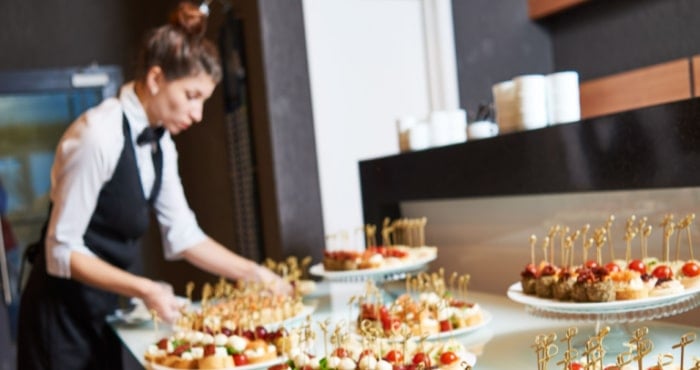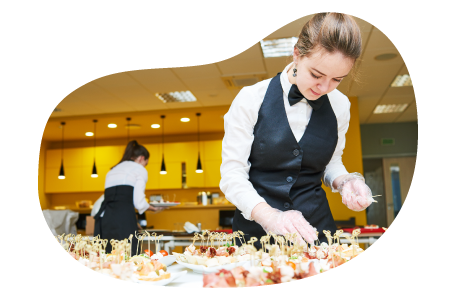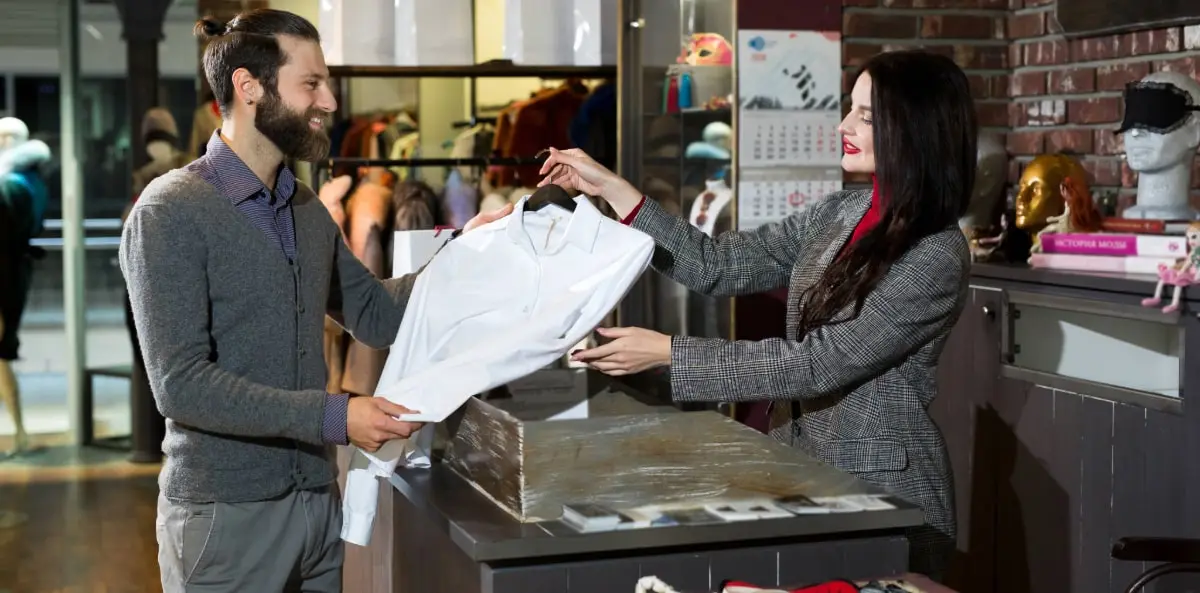What to know about catering licenses and permits

Caterers cook and prepare meals in one location, then serve them in another. Many new catering businesses start off as a part-time effort, preparing meals for friends and neighbors.
A catering operation can often grow so quickly that the owner might not realize they need a license to follow local laws, as well as insurance to keep their business financially protected. Let’s take a look at the licensing and insurance requirements for caterers.
When do you need a catering license or permit?
If you perform catering services on even a semi-regular basis, you’ll need a catering permit or license. Failure to get the right licenses could result in lawsuits and heavy fines, especially if alcohol is involved. Serving alcohol requires additional licensing to comply with state and local ordinances.
The Small Business Administration offers information on state and federal licenses for all types of businesses, as well as free business counseling for those starting a small business.
Check with your local county or municipal health department to see when you need a catering license and the types of licenses, such as food handlers licenses, that caterers need, as well as any general business license they might require. Your state health department or business licensing agency can also be a resource.

How do you get a catering license or food service permit?
The first step in starting a catering business is to decide what you’ll call your business, your business plan, and what your business structure will be. Will it be a limited liability company, or a sole proprietorship?
If you intend to operate your catering business as a sole proprietorship, and use a name different than your own, you’ll need to file a Doing Business As (DBA) registration with your local or state government, such as your county clerk or the secretary of state’s office.
It’s a good idea to check public records for the names of other businesses in your state to make sure no one else is already using the same business name as yours. If another caterer in your area is using a name similar to yours, it might confuse your customers.
Here are a few other things you’ll need to start your catering business:
- A business license or business permit from your local city or county government.
- An Employer Identification Number (EIN) from the IRS, also known as a tax ID number. This is used for all your tax filings and Social Security withholding accounts for your employees.
- A health permit from your local (city or county) department of health and safety.
Getting your catering license will involve filling out a license application with your state or local licensing authority, paying a license fee, and undergoing a health inspection of your kitchen and food preparation area.
While you might be able to bring your home kitchen up to code, many jurisdictions prohibit caterers from using their home kitchens for their business. You’ll likely have to rent space in a commercial kitchen or set up your own. It’s important to check with your local zoning authority to make sure it allows a food business where you intend to set up shop.
If you’re going to start your business from home, keep in mind that some jurisdictions have legal requirements that limit or forbid the types of businesses that can be run in residential areas.
What kind of catering licensing requirements are there?
Each state and local government has different licensing requirements for caterers, though there are similarities among them. Whether it’s called a license to serve food, a food handler’s license, a catering license, or a food and safety license, there are many similarities between all types of licenses for caterers.
If you serve or sell alcohol as part of your catering business, you’ll need a license from your state or local alcohol control authority. You might also have to obtain an additional permit for every catering function where you’ll be serving alcohol.
Let’s consider some examples of the kind of catering licenses you’ll need in different states.
California
California requires caterers to have at least one manager with a food safety certification from the California Department of Public Health. This person must have the authority to instruct others in proper food handling. Keep in mind that Los Angeles, Orange, and San Bernardino counties have their own licensing requirements.
Serving alcohol requires a Caterer’s Permit from the Department of Alcoholic Beverage Control, which must be renewed every year. The state also requires approval for each catered event with alcohol. A Catering Authorization Application must be submitted three to 30 days before an event, along with a fee based on how many people will attend.
Florida
Florida requires caterers to obtain a Catering Food Service Establishment license from the Division of Hotels and Restaurants in the Department of Business & Professional Regulation. All food storage and preparation must be within a licensed food service establishment, as private residences are not allowed.
A 13 CT caterer license is required to sell and serve alcohol with food.
Illinois
Catering businesses and restaurants in Illinois need a Meat and Poultry Broker license from the Illinois Department of Agriculture. This license is required for any business that sells cooked meats or entrees directly to consumers.
Caterers who serve alcohol “as an incidental part of food service” must have a Caterer Retailer license [PDF] from the Illinois Liquor Control Commission.
Texas
Texas requires caterers to obtain a health permit from your local city or county health department, or from the Texas Department of State Health Services. At least one person in your business must be a Department of State Health Services certified food handler.
Serving alcohol requires a permit from the Texas Alcoholic Beverage Commission. A caterer must first obtain either an RM or MB mixed beverage permit. An RM permit allows the sale of alcohol for consumption on the premises. An MB permit allows restaurants to sell alcohol for consumption on the premises.
A Caterer’s Permit allows the sale of alcohol on a temporary basis at locations other than the owner’s business location. Caterers must obtain a catering certificate [PDF] for every event where they will serve alcohol, with the paperwork submitted 10 business days before the event. You might also need the approval of your local government and/or law enforcement.
What types of insurance do caterers need?
Preparing meals for private events and friends might seem like risk-free opportunities, but you could face an expensive lawsuit if something goes wrong. To help keep yourself covered, you might want to consider investing in the following catering insurance policies before you serve your first meal.
General liability insurance
General liability insurance is often the first insurance policy that new businesses buy. It covers common business risks, such as customer injuries, customer property damage, and advertising injury. It’s typically required for commercial leases, and many contracts as well.
Commercial property insurance
Commercial property insurance covers your business location whether you own or rent the property. It can help pay for the repair or replacement of your catering equipment and inventories if they’re lost, stolen, or damaged by vandalism, fires, and bad weather.
Business owner's policy (BOP)
A BOP combines your general liability and commercial property insurance under one policy and is usually less expensive than buying each coverage separately. It's a popular policy for caterers since they typically will need both policies.
Worker's compensation insurance
Workers’ comp is typically required in most states for businesses with one or more employees. It covers the medical costs of work-related injuries that likely wouldn’t be covered by your regular health insurance. It also partially offsets lost wages if you or an employee are unable to work.

Commercial auto insurance
Commercial auto insurance is similar to your personal auto liability coverage. Commercial auto covers your legal expenses and property damage if your catering vehicle is in an accident, and is usually required in most states.
Hired and non-owned auto insurance is a form of auto insurance that covers any personal, leased, or rented vehicles that you or an employee use for your catering business. Your personal auto insurance is unlikely to cover you for a work-related accident.
Liquor liability insurance
Liquor liability insurance covers the cost of injuries and property damage caused by an intoxicated person who was served by your catering business. It’s typically required for any business that holds a liquor license.
Compare catering insurance quotes from trusted carriers with Insureon
Complete Insureon’s easy online application today to compare insurance quotes from top-rated U.S. carriers. You can also consult with an insurance agent on your catering business insurance needs. Once you find the right types of coverage for your small business, you can begin coverage in less than 24 hours.









